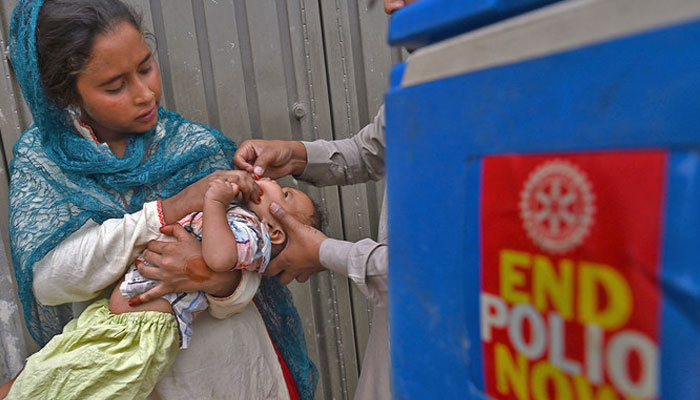Year’s first polio case reported in Dera Bugti
NHS official said the child developed sudden weakness of both lower limbs with high-grade fever on February 22
ISLAMABAD: Pakistan’s polio eradication efforts suffered another setback after health authorities on Thursday confirmed that a 30-month-old male child was permanently paralysed by the Wild Poliovirus 1 (WPV1) in Dera Bugti district town of Balochistan.
“A 30-month-old male child from UC Sui-3, Village Doodwani Colony, Dera Bugti town of Balochistan, has been affected by the Wild Poliovirus 1. It is Pakistan’s first polio case of the year 2024,” an official of the Ministry of National Health Services, Regulations and Coordination (NHS,R&C) told The News.
The NHS official said the child developed sudden weakness of both lower limbs with high-grade fever on February 22, 2024 and as the area lacks proper health facilities, the child was taken to a children complex at Rahim Yar Khan, where a pediatrician notified the case and stool sample of the child was sent to the regional reference laboratory at the National Institute of Health (NIH), Islamabad, for confirmation.
“The regional reference laboratory for polio at NIH Islamabad confirmed that the child has been affected by the Wild Poliovirus 1. The genetic sequencing revealed that the isolated virus belongs to genetic cluster YB3A and 99.44 percent linked to an environmental sample collected from Quetta on November 20, 2023,” the official added.
On the whole, Wild Poliovirus 1 (WPV1) was detected in 10 more environmental (sewage) samples collected in February 2024, including five from district Karachi East, and one each from districts Karachi South, Dir Lower, Nasirabad, Quetta and Dera Bugti, the NIH official said.
These new detections take the total number of positive environmental (sewage) samples for WPV1 in Pakistan in 2024 to 56.
-
 Lana Del Rey Announces New Single Co-written With Husband Jeremy Dufrene
Lana Del Rey Announces New Single Co-written With Husband Jeremy Dufrene -
 Ukraine-Russia Talks Heat Up As Zelenskyy Warns Of US Pressure Before Elections
Ukraine-Russia Talks Heat Up As Zelenskyy Warns Of US Pressure Before Elections -
 Lil Nas X Spotted Buying Used Refrigerator After Backlash Over Nude Public Meltdown
Lil Nas X Spotted Buying Used Refrigerator After Backlash Over Nude Public Meltdown -
 Caleb McLaughlin Shares His Resume For This Major Role
Caleb McLaughlin Shares His Resume For This Major Role -
 King Charles Carries With ‘dignity’ As Andrew Lets Down
King Charles Carries With ‘dignity’ As Andrew Lets Down -
 Brooklyn Beckham Covers Up More Tattoos Linked To His Family Amid Rift
Brooklyn Beckham Covers Up More Tattoos Linked To His Family Amid Rift -
 Shamed Andrew Agreed To ‘go Quietly’ If King Protects Daughters
Shamed Andrew Agreed To ‘go Quietly’ If King Protects Daughters -
 Candace Cameron Bure Says She’s Supporting Lori Loughlin After Separation From Mossimo Giannulli
Candace Cameron Bure Says She’s Supporting Lori Loughlin After Separation From Mossimo Giannulli -
 Princess Beatrice, Eugenie Are ‘not Innocent’ In Epstein Drama
Princess Beatrice, Eugenie Are ‘not Innocent’ In Epstein Drama -
 Reese Witherspoon Goes 'boss' Mode On 'Legally Blonde' Prequel
Reese Witherspoon Goes 'boss' Mode On 'Legally Blonde' Prequel -
 Chris Hemsworth And Elsa Pataky Open Up About Raising Their Three Children In Australia
Chris Hemsworth And Elsa Pataky Open Up About Raising Their Three Children In Australia -
 Record Set Straight On King Charles’ Reason For Financially Supporting Andrew And Not Harry
Record Set Straight On King Charles’ Reason For Financially Supporting Andrew And Not Harry -
 Michael Douglas Breaks Silence On Jack Nicholson's Constant Teasing
Michael Douglas Breaks Silence On Jack Nicholson's Constant Teasing -
 How Prince Edward Was ‘bullied’ By Brother Andrew Mountbatten Windsor
How Prince Edward Was ‘bullied’ By Brother Andrew Mountbatten Windsor -
 'Kryptonite' Singer Brad Arnold Loses Battle With Cancer
'Kryptonite' Singer Brad Arnold Loses Battle With Cancer -
 Gabourey Sidibe Gets Candid About Balancing Motherhood And Career
Gabourey Sidibe Gets Candid About Balancing Motherhood And Career




